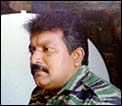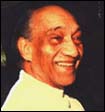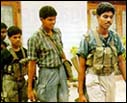The Rediff Special/J N Dixit
'General Harkirat Singh was perturbed by the
civilian demonstrations instigated against the IPKF by the LTTE'
 The LTTE was in daily touch with the IPKF headquarters in Jaffna. Prabhakaran was a frequent visitor to the Headquarters Officers
Mess. By the middle of September, however, the LTTE decided to
pull back from the 'limited co-operation' stance it had taken
on the Indo-Sri Lanka Agreement. Indian military personnel faced
demonstrations forcibly organised by the LTTE against the Sri
Lankan government and also against Indian policies.
The LTTE was in daily touch with the IPKF headquarters in Jaffna. Prabhakaran was a frequent visitor to the Headquarters Officers
Mess. By the middle of September, however, the LTTE decided to
pull back from the 'limited co-operation' stance it had taken
on the Indo-Sri Lanka Agreement. Indian military personnel faced
demonstrations forcibly organised by the LTTE against the Sri
Lankan government and also against Indian policies.
Thileepan -- an idealistic and committed LTTE leader -- commenced a
fast unto death in one of the main temples of Jaffna, taking the
stand that the Indo-Sri Lankan Agreement did not fulfill Tamil
aspirations and that India was not doing enough even to implement
the provisions of the Agreement. The situation was becoming critical
just about five weeks after the Agreement was signed.
At this stage, pressure was generated by leaders of the civilian
population in Jaffna on the high commission to set up the interim
council for the proposed north-eastern province. There were messages
from Delhi directing me to urge Jayewardene to nominate an interim
governing council in consultation with various Tamil groups as
early as possible.
Prabhakaran was in the meanwhile refusing to
enter into any discussions about the constitution of the interim
governing council with local Sri Lankan government representatives
or with the Indian army authorities who were now practically conducting
the civilian administration of Jaffna.
 After the token surrender
of arms, Prabhakaran remained entrenched with his closest advisers
and military cadres in the Jaffna university area and in strategically
selected points throughout the Jaffna peninsula.
After the token surrender
of arms, Prabhakaran remained entrenched with his closest advisers
and military cadres in the Jaffna university area and in strategically
selected points throughout the Jaffna peninsula.
Prabhakaran was insistent that Jayewardene should first devolve
all the required powers immediately to the interim governing council.
He was not willing to wait for the necessary constitutional amendments
and procedural requirements to be completed. In fact, he viewed
the delays with profound suspicion.
The LTTE's own intelligence
sources must also have given him fairly accurate information about
(Prime Minister) Premadasa and Lalith Athulathmudali trying to sabotage the agreement,
perhaps even preparing to resume military operations against the
LTTE either through the instrumentality of Janatha Vimukti Perumana cadres or through
military and security personnel who could be encouraged to rebel
against Jayewardene's authority.
General Harkirat Singh was getting increasingly perturbed by the
civilian demonstrations instigated against the IPKF by the LTTE
and the agitated political overtones that marked the discussions
held by the LTTE leadership in Jaffna with Indian army officers.
He sent messages to army headquarters seeking my presence
in Jaffna to bring the temperature down.
 Having had some insight
into the working of Prabhakaran's mind as well as his reaction,
I was totally reluctant to have any discussions with him. Most
of his interactions with Indian representatives were through personnel
of our intelligence agencies over the years. I told Delhi initially
when they asked me to undertake these discussions that Prabhakaran's
old and established Indian contacts should undertake this task.
But General Harkirat Singh viewed the matter differently. At one
stage, he even complained about the high commission being unwilling
to take on its political responsibilities.
Having had some insight
into the working of Prabhakaran's mind as well as his reaction,
I was totally reluctant to have any discussions with him. Most
of his interactions with Indian representatives were through personnel
of our intelligence agencies over the years. I told Delhi initially
when they asked me to undertake these discussions that Prabhakaran's
old and established Indian contacts should undertake this task.
But General Harkirat Singh viewed the matter differently. At one
stage, he even complained about the high commission being unwilling
to take on its political responsibilities.
Excerpted from Assignment Colombo, by J N Dixit, Konarak Publishers, 1998, Rs 400, with the publisher's permission.
Readers interested in obtaining a copy of the book may direct their enquiries to Mr K P R Nair, Konark Publishers, A-149, Main Vikas Marg, New Delhi 110 001.
Tell us what you think of this feature
|



